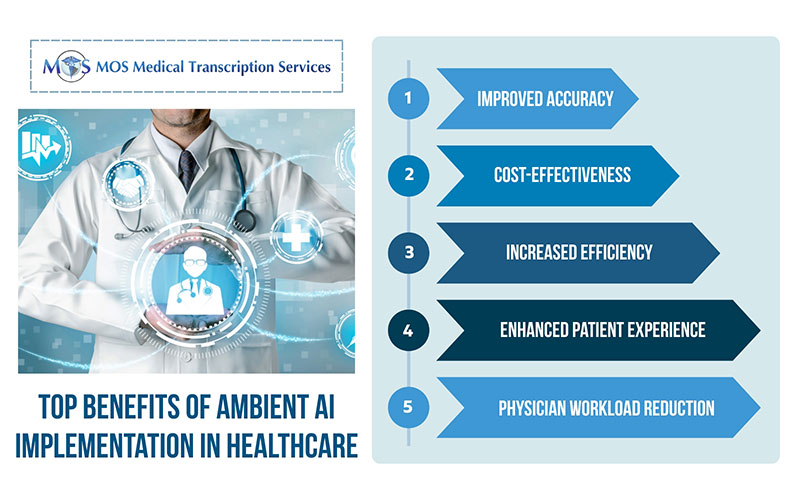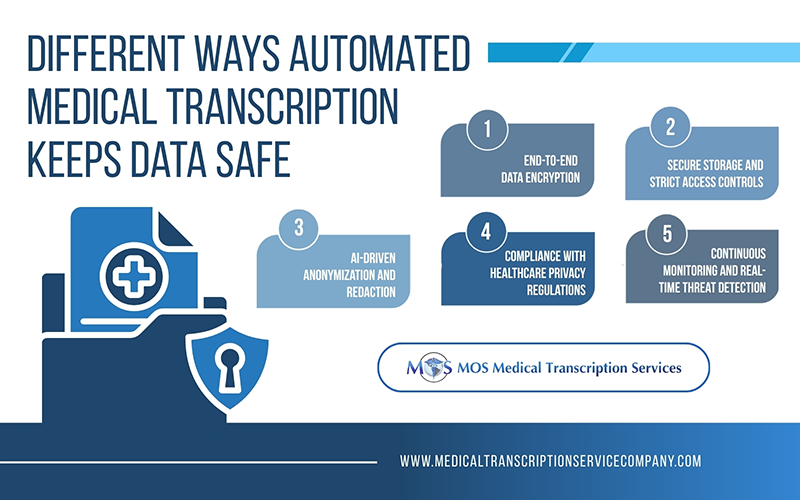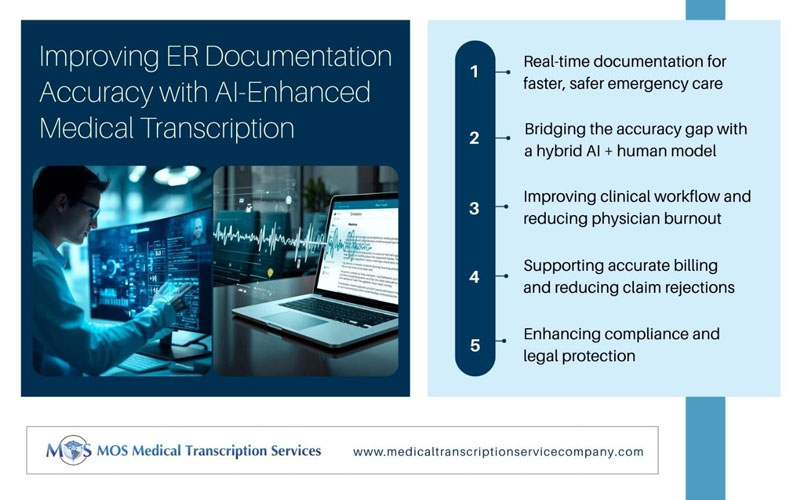Table of Contents
In the demanding field of healthcare, relentless hours of work and administrative overload are among the leading causes of healthcare provider burnout. Despite technological advances, many practices struggle with inefficient processes, inaccurate billing, and revenue leakage. A major administrative burden that contributes to these issues is medical documentation, with nearly 75% of healthcare providers reporting that it negatively impacts their patient care.
The good news is that the rise of artificial intelligence is revolutionizing the medical field by minimizing manual documentation tasks and optimizing clinical operations. Ambient AI, also called Ambient Intelligence, is one such groundbreaking technology that is reshaping the medical documentation process. These intelligent systems automate documentation by passively listening to clinical conversations and generating accurate notes in real-time. However, while AI-generated documentation offers many benefits, the technology comes with risks of misinterpretation of medical terms, accents, or context. Physicians can avoid inaccurate or incomplete records by relying on a professional medical transcription company to review the automated transcripts.
How Ambient AI is Transforming Medical Documentation in Healthcare
Ambient AI refers to the intelligent, AI-powered voice recognition system designed to listen, analyze, and record patient-provider conversations in real-time. Ambient dictation tools to produce clinical documentation are powered by sophisticated machine learning, natural language processing, speech recognition, and generative AI capabilities. Unlike basic transcription software or manual note-taking, ambient AI is an intuitive technology that works quietly in the background, requiring minimal direct user inputs.
These systems are trained on a vast set of clinical data, enabling them to understand medical terminology, detect context, and structure relevant details into accurate and compliant documentation. This eliminates the need for manual data entry as AI transforms patient interactions into structured notes that can be directly uploaded into electronic health records (EHRs). Healthcare providers can integrate AI-enabled clinical notes seamlessly into their operations to reduce burnout, improve efficiency, and support better outcomes across various fields, such as:
- Emergency Care: In the fast-paced emergency department, ambient AI can help reduce the time spent on documentation by automatically capturing patient symptoms, medical history, and initial diagnoses. This allows ER physicians to perform life-saving procedures, make critical decisions, and enhance care delivery while ensuring accurate documentation.
- Primary Care: By reducing the time doctors spend on typing or writing down notes, primary care physicians can engage in more meaningful face-to-face interactions with patients. Ambient listening tools ensure entire medical history, concerns, treatment plans, and follow-up details are accurately captured during the patient visit without interruptions.
- Surgery: During and after surgical procedures, ambient AI systems can document surgical notes, patient progress, and postoperative care instructions directly into the EHR. This allows surgeons to concentrate on the operation itself, improving both efficiency and precision.
- Specialty Care: Specialists in areas such as cardiology, oncology, and psychiatry can benefit from AI’s ability to record and analyze specific, complex patient data. Reducing manual entries prevents human errors, allowing doctors to develop accurate and personalized treatment plans, improve interoperability between different healthcare systems, and take informed clinical decisions.
- Telemedicine: AI can assist remote care providers by recording and transcribing virtual consultations. This enables healthcare providers not only to enhance care access in remote regions, but also improve patient safety and support compliance with accurate records.
By effectively addressing specific challenges in the documentation process across clinical sectors, ambient clinical intelligence can enhance healthcare workflows and quality of care.
Key Benefits of Ambient AI in Healthcare
The integration of Ambient AI provides immense benefits to healthcare providers in terms of both administrative and clinical tasks. Key advantages include:
- Physician Workload Reduction: One of the most significant advantages of ambient AI is its potential to reduce physician burnout. With less time spent on manual documentation, physicians can focus on patient care and spend less time dictating notes, thus improving overall job satisfaction.
- Enhanced Patient Experience: With AI handling documentation in real-time, physicians can engage more directly with patients, fostering better communication. This can lead to a more thorough understanding of their concerns, enhance the overall quality of patient encounters, and improve patient satisfaction.
- Improved Medical Billing Accuracy: Given its training on clinical data, jargon, and context, ambient AI ensures accurate and comprehensive access to clinical insights, highlighting critical decision-making points. Since AI captures every crucial detail in patient encounters such as medical history, symptoms, allergies, and medications, this reduces likelihood of omissions or errors in documents that could affect treatment plans.
- Increased Efficiency: AI-driven transcription tools reduce the time clinicians spend on administrative tasks. By eliminating routine data entry, clinicians can allocate more time to diagnosing and treating patients. By delegating documentation tasks to ambient AI systems, providers can generate notes that align with their preferred style, and format, thus improving operational efficiency.
- Cost-Effectiveness: By optimizing workflow and reducing administrative overhead with ambient AI, healthcare providers can enhance accuracy of claim processing systems. Improved clean claims rate leads to enhanced revenue cycle, allowing practitioners better allocate resources. This is especially valuable in the context of rising healthcare costs and the need for sustainable practices.
Key Challenges of Implementing Ambient AI in Medical Documentation Processes
While Ambient AI provides unique benefits to healthcare professionals, it comes with some challenges in clinical documentation:
- Data Privacy and Security: The sensitive nature of healthcare data requires that AI systems be secure and compliant with regulations such as HIPAA. Providers must ensure that patient data is protected by investing in a HIPAA-compliant system to maintain trust and adhere to regulatory compliance.
- Electronic Health Records (EHR) Integration: Many healthcare institutions still rely on legacy systems, and integrating ambient AI with these systems can be complex and costly. Seamless interoperability between AI systems and existing EHR platforms is a key consideration.
- Adoption Barriers: There may be chances of resistance to implementation of advanced AI tools from staff or clinical workers who may not be familiar with AI-driven technologies. In such cases, providing adequate training and workshops for staff will be critical to ensure successful adoption
- Human Oversight: Despite the advancements in AI, human oversight remains essential. AI-generated documentation still needs to be reviewed thoroughly by clinicians to ensure that it accurately reflects patient interactions and medical decisions. If the data is flawed, it can compromise patient care.
Embrace the Future of Medical Documentation
As the healthcare advancements continue to evolve, the integration of AI-driven tools such as Ambient AI represents a pivotal shift towards smarter and efficient care delivery. For practices that want to leverage advanced AI systems in their operations, medical transcription outsourcing is a strategic solution. Ambient AI can make errors in transcription that can affect diagnosis, treatment, or billing, and partnering with an experienced transcription company can help overcome this challenge. Reliable companies have stringent quality measures in place to ensure human oversight and review of AI-generated documentation. This hybrid approach allows providers to benefit from cutting-edge technology and expert validation, positioning them for success in the increasingly technology-driven healthcare landscape.




